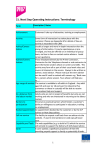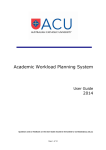Download 3. Operating Instructions: The Service Offer
Transcript
3. Operating Instructions: The Service Offer 1. The integrated adult careers service will be a single integrated service with three delivery channels (web, telephone and face-to-face) operating under one brand and shaped by local partnerships and innovative ways of working. 2. The service will provide a universal offer, for all those in and out of work. It will provide targeted support focusing on people with specific barriers to getting into and on in work. 3. One of the objectives of the service is to build lifelong relationships with its customers, to encourage them to use the service throughout their lives and not just in times of crisis. 4. The integrated adult careers service will help people find the right combination of advice for them, reflecting their specific needs to help them progress in work and life. It will: provide personalised relevant advice on getting on in work and life, reflecting individual needs and situations; enable customers to manage their own careers and provide the appropriate level of support to meet their needs; be available for any adult aged 19 and over (or 18 and over for Jobcentre Plus customers or those in custody). See Working with Offenders section for further detail of how Prime Contractors will work with Offenders. allow people, who require more intensive, ongoing support, to get that support on the basis of their need 5. The service will work closely with Jobcentre Plus and other partners such as those delivering careers services to young people, those working with offenders, Further education, Local Authorities and Higher Education. An integrated offer 6. The service will be delivered through three channels. These are: A national website - available to individuals via self service and mediated through an adviser A national contact centre providing support through telephone, email and web forums. The national telephone number is 0800 100 900 A regional and local face-to-face channel providing access to advisers at venues local to individuals. 7. All Prime Contractors and the Contractor for the Telephone channel must work together to form a truly integrated and improved offer to individuals. The three channels of the service will be integrated by: applying the single brand and telephone number provided by the Skills Funding Agency and Department for Business Innovation and Skills( BIS); use of a single national telephone number the availability of consistent web based tools and providing a personalised offer that takes account of the customer profile along with their need and adviser assessment (self directed through the web) using a common customer relationship management system seamless customer journeys through the service between web, telephone and face-to-face channels; and applying common workforce standards, processes, procedures, technology and training across the service. Target Audience 8. The service is available to all people in England aged 19 and over (or 18 and over for Jobcentre Plus customers or those in custody) 9. National priority groups have also been identified and customers within these groups are able to receive ongoing face-to-face support through additional sessions with an adviser. Customers who fall outside these priority groups can access additional advice sessions via the telephone and web (virtual adviser) channels. 10. The priority groups are: low-skilled adults (i.e. without a full level 2 qualification, especially women) who are locked in low-skilled, low-prospects jobs young adults aged 19-24 without a level 3 qualification Adults facing redundancy, newly redundant or at a distance from the labour market Jobcentre Plus customers in receipt of out-of-work benefits people from ethnic minority communities adults aged 50 plus carers1 as defined by Department of Health guidelines offenders in custody and in the community under the supervision of probation services and ex-offenders 1 A carer spends a significant proportion of their life providing unpaid support to family or, potentially, friends. This could be caring for a relative, partner or friend who is ill, frail, disabled or has mental health or substance misuse problems(this definition is subject to review and consultation) people with a self-declared learning difficulty or disability (including those with mental health conditions). Priority Objectives for the Service 11. The priority objectives of the service are to: deliver a service which is fully integrated and seamless between the faceto-face, telephone and web delivery channels and which signposts and refers individuals to these channels according to individual needs deliver a high quality and personalised service that provides information, advice and support on skills, careers and learning opportunities to customers provide skills assessment services to individuals with identified skills needs who have either been referred by other agencies or self-referred. This will include the production of a Skills Action Plan. use a range of products and tools to support the delivery of personalised, up to date information and advice on careers and skills support national and regional marketing strategies and assist customers in getting the information they need. Support and level of service available 12. The service will provide - either through a careers adviser (face-to-face, by telephone or email via the web) or by self- service through the web channel a range of support described in the table below. Support Available Description General information/Careers and skills generic information General information about the service– for example how the service can help or support finding information on the website General (not personalised for a specific customer) information about careers and skills Personal skills assessment/audit, with the aid of ITbased tools Information relating to a campaign such as ‘Our Future. It’s in our hands’. Links to Jobcentre Plus to provide information on specific job opportunities Ability to book telephone or face-to-face careers and skills advice sessions Course search Job profiles Help with using IT-based tools Specialist Advice Tailored careers and skills advice which can be provided via the telephone and face-to-face for example: information for those facing redundancy, or returning to work following a planned absence This also includes referrals out to partners and specialist advice services, for example community health specialists, or benefits rights and entitlements Personalised advice Personalised service, which results in an action plan with agreed follow-ups Advice regarding skills and interests, CV help, Detailed skills assessment Confidence building and empowerment One-off assessment or multiple sessions based on customer need The ability to register with Next Step and set up a personalised online space 13. The service will support a broad range of customers’ needs which are set out in the table below. Many customers will have a combination of these needs and will need a range of services to be delivered to help them progress. Component Description Develop my career Advice to help a customer choose or change career Providing up-to-date national, regional and local, sector labour market information Detailed careers information such as qualifications and skills required for roles Improve my skills Providing personalised skills assessment and advice on how to find and access learning Advice to find and enrol on a course Access to information on provider quality Support in registering for Next Step Job readiness Equipping customers to successfully apply for a job Example tools: CV builder / Interview advice / Local labour market information Links to Jobcentre Plus Funding and eligibility advice Information and advice related to funding or eligibility for funding Information and advice on Learner Support programmes and Child Care and Career Development Loans Support Specialist help, advice and referrals to partners and specialist advice services e.g. returning to work such as Citizens Advice Bureau, housing associations, childcare, legal advice, debt advice etc. How the service is personalised 14. The service offer to individuals depends on the profile of the customer and an individual adviser assessment (self directed on the web) of their situation and the outcome needed. A customer could have an initial session or multiple sessions and they could use one delivery channel or a mixture - it all depends on their profile, need and preference. 15. The level of personalisation will also depend on the amount of information the customer provides. The more information that is provided, the richer, more personal, specific advice/support can be given. At all levels of service help and advice can still be provided but it will not be as rich and not all information will be saved to create a history. 16. The following table provides a view of how customers can access the service at differing levels in order to personalise the support that they receive. There are different features of the service available to customers through public browsing and full registration, whereas full registration is achieved through registering for Next Step on the web or creation of a CRM record by an adviser. Public Browsing General browsing on the web site Picking up a leaflet from a face-toface adviser or key partners Asking for general information when calling the telephone channel Case study & brief description of entitlements Careers & Job Information Latest news Videos / Audio Promotional material Course search (Course Directory) Access to LMI Eligibility checker for learner support Ability to create an action plan, (via web channel) Statement of eligibility for government funding No activity from using the web channel saved (e.g. searches and Full Registration Customer record via the CRM is created/exists (when the customer contacts the telephone or face-to-face channels or sends an email via the web channel). Full customer details and shared secrets captured to support on-going interventions across telephone and faceto-face channels Access to advice via the telephone or faceto-face channels Full Skills Action Plan saved (via telephone & face-to-face channels when receiving an advice session) Supports cross referrals between telephone and face-to-face channels Next Step registration created/exists for personalised online space Customer can save searches and functions such as CV builder Encourages more self-help functions such as CV) A limited customer record can be created (anonymous) Demographics data captured in CRM when accessing the telephone and face-to-face channels (anonymous) An enquiry can be logged in CRM and is managed as an intervention Access to information Full skills action plan saved Creating and storing personal details generated through the skills diagnostic tool and saved searches (e.g. from course searches) Skills assessment report saved from skills diagnostic tool Customer can provide a user name and password to access forums (via the web channel). 17. When delivering the service, advisers must: create a customer record through the customer relationship management (CRM) system encourage customers to register for Next Step to allow them to manage their own careers as appropriate clearly outline the offer, access points, types and level of service available signpost or refer to other channels ensure the service is consistent across face-to-face and telephone channels. A customer can self- serve using tools and information on the web enable the customer (with adviser support as appropriate) to personalise/use the service to meet their need. Face-to-face channel offer 18. The face-to-face channel will be delivered on a sessional basis. All adults aged 19 and over (and 18 year olds who are Jobcentre Plus customers or in custody) can access a free careers and skills advice session from a careers adviser. Adults who are in one or more of the priority groups set out in paragraph 10 will be entitled to access multiple sessions to address their career and skills needs. 19. The Prime Contractor for the face-to-face channel must: ensure that adults receive labour-market focused careers and skills advice that helps them to progress into learning and or work and sustainable employment and ultimately realise their career ambitions. provide (where appropriate) additional and ongoing careers and skills advice for priority customer groups (as defined by national and regional priorities) to help their progression into training and sustainable employment. ensure flexible delivery arrangements through a range of locations, and outlets supported by strong partnership working which may include signposting and referrals to other channels. ensure all adults have access to a free careers and skills advice session from a qualified adviser that includes; a diagnosis of careers and skills needs provision of initial advice on actions to be taken in the context of their careers and skills goals and the labour market agreement of careers and skills goals for the short and medium term. access to other services including registration for Next Step to provide a personalised online space, referral to learning or other appropriate provision and job search support. information on access to further face-to-face sessions (for those in priority groups or paying for services) and careers and skills advice through the telephone and web channels. ensure that adults in the specified national priority groups set out in paragraph 10 are entitled to additional free sessions. These sessions may include: further detailed advice and support identification of personal careers and skills goals and targets A skills and career assessment using the skills diagnostic tool (SDT). agreement with customers on one or more interventions or referrals to learning and skills provision, specialist provision for those affected by the economic downturn or other support to help overcome barriers to entering learning and sustainable employment. support for learning brokerage, career progression and/or job search. 20. Individuals outside of the priority groups who require additional support beyond the initial face-to-face session have the following support available to them. Accessing further fully funded support via the telephone channel Use of the web channel to access a range of tools and services Paying for further face-to-face support where the contracted provider offers a fee-based service. Any fee charged to the individual should not exceed the funding provided by the Skills Funding Agency ; or Using another face-to-face provider of their choice for further specific support with charges agreed between the individual and the provider. 21. Prime Contractors will also be able to inform individuals about specialist feecharging services which may be useful to them. Access to the face-to-face channel 22. Access to the face-to-face channel will be through a range of flexible delivery mechanisms. It is a requirement that the Prime Contractor ensures the customers have access to the service in a way that meets their particular needs. 23. Access arrangements should include: individual one to one sessions that meets the need of the customer. outreach advisers and activities drop-in workshops e.g. for job search support customised careers and skills advice programmes (with specific groups) partnership delivery with Jobcentre Plus and community based organisations links with learning and training providers including informal adult learning; and Links with employer facing support (including skills brokers) and Union Learning Representatives 24. Arrangements could also include; Imaginative use of tools and resources (e.g. webcams)- however customers requiring telephone or email advice should be signposted or referred to other channels Group activities which provide value for money if appropriate for customers; and Drop in workshops e.g. for jobsearch support 25. In order to encourage access and use of the service it is a requirement that the Prime Contractor for the face-to-face channel ensures that the face-toface channel is visible through: identifiable ‘access points’ around the region; presence at local and regional events; co-location with Jobcentre Plus and a range of other organisations including probation; collaborative initiatives with community and partner organisations; outreach activities including adviser visits, ‘surgeries’ and group activities 26. Prime Contractors must offer flexible hours of operation to meet demand and customer need. This includes delivering the service to meet the needs of external organisations including employers in redundancy situations. 27. Prime Contractors must ensure arrangements are in place to receive calls through a single Prime Contractor contact point from the telephone channel to enable a seamless transfer of customers wanting to book a face-to-face session. As a minimum these arrangements should be available Monday to Friday 09.00 hours to 17.00 hours (excluding bank holidays). 28. In instances where customers contact the telephone channel for a face-toface appointment and the office is closed, information will be queued in the CRM for the Prime Contractor to follow up on the next working day (within 24 hours of the call). 29. Prime Contractors must ensure that there is comprehensive coverage of the face-to-face channel across the whole of the geographical area that the contract covers. 30. This must take into account of: those communities where web access might be limited or restricted where use of the telephone may be a barrier the needs of employed people who will require access to services outof-hours i.e. at evenings and weekends. 31. Prime Contractors must also ensure access to specialist services for all customers either through the knowledge and expertise of their delivery network or through signposting and referral on to other specialist agencies. Prime Contractors are expected to provide access to the following areas: financial advice linked to job or career change; HE access and funding advice; learner support advice (including funding, childcare and travel); benefits rights and entitlements; specialist advice for specific groups (e.g. offenders/ex-offenders) migrant workers; support for redundancy; pre-retirement support; sector specific labour market advice; advice on obtaining qualifications (particularly through the Qualifications and Credit Framework (QCF). regional and local advice services (in particular, financial and housing, childcare support); community health specialists The Telephone Channel offer Information 32. Through 0800 100 900, the telephone channel will provide free, impartial information including covering: provision of general careers and course information, including: o awareness raising of a customer’s entitlement to funded learning that leads to the achievement of specified qualifications o support in registering for Next Step to provide a personalised online space for customers o provision of more detailed careers information such as qualifications and skills required for job roles, funding advice, returning to work, childcare etc. skills assessment and diagnosis of customer need with the aid of IT-based diagnostic tools Appointment booking for advice sessions either via telephone or face-to-face (once a customer has been identified as being appropriate for this type of support according to customer need and profile) signposting to the web channel of the integrated adult careers service and /or other agencies/organisations as appropriate, such as Citizens Advice, debt advice agencies and legal advice handling of any complaints concerning the service or advice provided (according to an agreed complaints process) 33. For all customers accessing information a customer record must be created on the CRM system that includes summary of the discussions that take place. Advice 34. The advice service is an enriched offer that builds on the information service for customers who have more complex needs or require skills assessment activity. Delivery of additional telephone advice sessions is not dependent on customers being included in one of the priority groups for the service. An adviser will assist a customer during the first advice session and together they will create an action plan Upon agreement with the customer, the adviser will then call back up to three times to see how they are progressing against their skills action plan and to provide further motivational support Individuals using the advice service will benefit from an in-depth discussion with a suitably qualified adviser around moving into work, career change or in-work progression and resulting in an agreed skills action plan and possibly multiple interventions. 35. When customers are referred to the advice tier of the telephone channel every effort will be made to ensure that all calls can be referred immediately. Where this is not possible, advice sessions should take place within 24 hours of the initial call with the information service unless the customer requests otherwise. Language Line Services 36. The telephone channel will provide; The core services in Gujarati, Punjabi, Sylheti, Urdu, Farsi, Polish, French, Somali are all open Monday to Friday 9am – 5pm except for Punjabi and Urdu which is open 9am – 8pm Translation support for advice calls via a 3-way conversation between language line adviser, English-speaking in-depth adviser and the customer A service where advisers will contact learning providers to assist in booking customers onto courses A community liaison adviser who: o Visits outreach organisations to drive up demand for the service within communities o Is supported by a team of quality advisers who quality assure the services provided (this function is subject to review as a minimum on an annual basis). o Makes contact with each face-to-face region a minimum of twice a year. 37. Further information on the role of the community liaison adviser will be made available in due course. 38. The telephone numbers for language line services are available in the Ways of Working section of these Operating Instructions or the Next Step web-site. Partnerships, Helplines and Campaigns 39. The Contractor for the telephone channel will provide responses and fulfilment services for specific campaigns usually related to learning and skills. 40. Campaigns and Partnership arrangements are brokered by Skills Funding Agency and are the outcome of relationships with partners such as Sector Skills Councils, Broadcasters (e.g. BBC), and stakeholders such as Department of Business, Innovation and Skills (BIS) and other government departments. 41. The campaign/partner services will run similarly to the information service. They will provide free, impartial information or advice for specific campaigns relating to learning, skills and/or work. 42. Some campaigns use the main Next Step number 0800 100 900. Some campaigns, such as support for Jobcentre Plus customers currently require a dedicated telephone number and CRM script. 43. The Contractor will put in place an appropriate structure for managing the knowledge required for campaigns and generating the MI reports required. Services to support campaigns 44. Requests will come from customers telephoning a campaign service or the core service. All requests must be fulfilled within a maximum of 4 working days on receipt of the order. In addition, other services required will include; Providing adequate stock storage facilities, stock reports and audit. Providing packaging materials if required Set up of daily and weekly reports, and provision of summary reports Set up and maintenance of email facilities to support campaigns Data capture requests received by email Data items to be received in various formats; i.e. batch file (flat file –CSV (Comma Separated Values) or other via ftp (File Transfer Protocol) 45. The Contractor will manage messaging to support campaign responses and the core service. The messaging must ensure that during busy periods or out of hours, customers are offered alternatives to queuing for an adviser. Web Channel 46. The web channel will act as a virtual careers adviser and will replicate the offer available through the telephone or face-to-face channels. The web channel will be accessed directly by customers to allow the customer to selfserve a range of online tools and services. 47. Through the web channel individuals will be able to: Register for Next Step to create a personalised online space that includes storing documents set their career and life goals and aspirations understand their starting point in terms of the skills and personal attributes they have and what they need to do to meet their needs and ambitions. make informed choices using the tools and information available. undergo a skills assessment produce their own action plan create and save a CV; and be supported to use the information effectively and understand the best route to achieving their goals. Telephone channel to face-to-face 1. Advisers for the telephone channel must always make customers aware of the face-to-face service and discussion should include reference to the local services being available. 2. The Prime Contractor must ensure arrangements are in place to receive calls from the telephone channel so that there is a seamless transfer of customers wanting to book a face-to-face session. 3. The telephone number for each Prime Contractor will not be public facing but will only be used by telephone contact centre staff to make contact with the face-to-face channel. This can include the warm transfer of customers to book the appointment themselves. 4. As a minimum these arrangements should be available at the face-to-face service Monday to Friday 09.00 hours to 17.00 hours (excluding bank holidays). See Hours of Operation section. 5. When advisers contact the telephone channel for a face-to-face appointment and the office of the face-to-face Prime Contractor is closed, then tasks will be queued in the CRM for the Prime Contractor to follow up on the next working day. Details held in the queuing system will include contact details and the reason for the enquiry. The customer will then be contacted directly by the face-to-face service 6. For Jobcentre Plus customers the following arrangements will apply: Jobcentre Plus advisers will signpost their customers to Next Step using the national telephone number 0800 100 900 Jobcentre Plus advisers wanting to book a face-to-face appointment should telephone 08000 924 429. However, in co-located offices if a Next Step Advisers is available the Jobcentre Plus adviser can refer the customer for an immediate appointment if the adviser is free or an appointment can be booked directly through the CRM system. Where engagement activity is taking place e.g. jobsfairs, advisers can book appointments directly through the CRM without going through the telephone channel Face-to-face to telephone channel 7. Customers must always be made aware of the telephone channel and discussion should include information on the extended opening hours of the telephone channel and ongoing service offer. The amount and type of use the customer makes of the telephone channel will be driven by customer choice and needs. All customers can make use of the telephone channel at any point in the service. 8. Particular examples of when customers may need or choose to make use of the telephone channel might include, if they cannot easily travel to a face-to-face location, when they have exhausted their entitlement to the funded face-toface offer or when they fall outside the priority group for additional free faceto-face advice sessions. 9. Customers may use the information and advice services of the telephone channel as many times as they wish Face-to-face to web channel 10. All face-to-face advisers must make customers aware of the web channel and service offer available on the web, including the ability to use web channel at any time. This may also be included as a resource in the Skills Action Plan. 11. The customer can always choose to use the web channel and should be encouraged to do so when it is apparent that the customer can self-serve through this channel. 12. Customers should also be encouraged to register for Next Step on the web to enable them to create their own personalised online space, including storing documents such as CVs and Skills Diagnostic tool results. 13. Other examples of when customers may need or choose to make use of the web channel might include when they have exhausted their entitlement to the face-to-face advice offer or when they fall outside the priority group for additional free face-to-face interventions. But all customers can make use of the web channel at any point in the service and at any time. 14. The Prime Contractor must ensure that all face-to-face advisers understand the role of the website and can use the website and resources as part of their session with a customer and (based on customer need and choice) must be able to: Support customers to register for Next Step to create their own personal online space Use the skills diagnostic tool Search for course details and locations View relevant job profiles Point customers to the website for advice on producing CVs ,covering letters and applying for jobs Use the job search facility where appropriate Access advice on funding sources for learning View and use national and regional labour market information Web channel to face-to-face 15. The web channel will provide the contact address for the main delivery site of the face-to-face Prime Contractor for customers who make the choice to follow up their web experience with a face-to-face contact. It is envisaged that at a later date the facility for a customer to search for a local office in their area directly from the web channel will also be available. Contact with the face-toface service will still be made through the single national telephone number. 16. In particular the customer may contact the face-to-face channel (via the national telephone number) for additional support, if for example if they need more help to interpret their Skills Diagnostic report or would like a more detailed conversation about local services. 17. The customer will always be given the option of making contact with either the face-to-face service or the telephone service. Web channel to telephone channel 18. The web channel will provide the national telephone for the customer to access additional support from a telephone contact centre adviser. This may be for ‘first line’ support or, if appropriate, onward referral may be made to advice available through the telephone channel. 19. In particular the customer may contact the telephone channel for additional support, if for example if they need more help to interpret their Skills Diagnostic Tool report. 20. The customer will always be given the option of making contact with either the face-to-face service or the telephone service. Telephone channel to web service 21. Telephone contact centre advisers should always tell customers about the web channel including the ability to use the web at any time. 22. Customers should also be encouraged to register for Next Step on the web to enable them to create their own personalised online space, including storing documents such as CVs and Skills Diagnostic tool results. 23. The customer can choose to use the web channel and should be encouraged to do so when it is clear that the customer can self-serve through this channel. Telephone numbers for the Service 24. The national telephone number for the service is 0800 100 900 25. In addition a separate number will exist to provide an access route to the contact centre for Jobcentre Plus customers and advisers, where a customer has been signposted or referred to the service. The telephone number for Jobcentre Plus customers and advisers is 0800 924 429 26. All calls go through to the same single pool of first line advisers at the telephone contact centre. 27. The telephone contact centre adviser can identify the number that the caller has dialled whilst on the phone and respond appropriately to support different campaigns. 28. Separate telephone numbers are available on the customer web portal to support customer with specific language needs. 29. The telephone numbers for the Language Line services are: Language Gujerati Punjabi Somali Syleti Urdu Farsi Polish French Telephone number 0800 093 1119 0800 093 1333 0800 093 1555 0800 093 1444 0800 093 1118 0800 093 1116 0800 093 1114 0800 093 1115






























